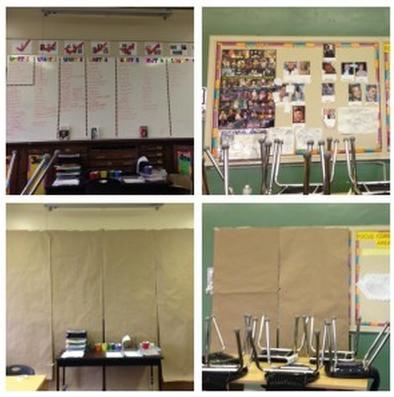INSIDE TAKE: Standardized Testing Isn’t Worth It

It’s not like this.
(Editor’s note: This column is the first of many to come from Citified insiders, our roster of urban doers, experts and advocates who will offer their takes on a wide array of issues, from schooling to policing to politicking. Insiders are not Phillymag staff, and their opinions are their own. Read more about our insiders here.)
I’m cranky this week.
I spend a lot of time trying to make my classroom, Room 207 at the Paul Robeson High School for Human Services, welcoming. I have my contact information in four places. I bought comfortable chairs. I decorate with seemingly important quotes and song lyrics, I post student work, I use bright colors. I shake hands and give high-fives at my doorway. I’ve developed a reputation for preaching, in a secular way of course, the gospel of being in class, on time (“You can’t say TGIF if you don’t have a job, and you won’t have a job without succeeding in the classroom”).
I greet a lot of students by name; I heckle and get heckled. It’s love.
My principal greets everyone at the door. Our staff has built lasting, meaningful relationships. On a typical day, you can show up at 3:30 and see kids helping, tutoring, or just…there. They don’t want to leave.
But this week, for the state-mandated Keystone Exams (3 two-hour subject tests, soon to be a graduation requirement) I tear down their work or, for certain immovables, cover the walls with opaque trash-can lining. I have to talk in hushed tones. When I greet my kids, I need to quickly get them in their seat, with a number 2 pencil. I need to make absolutely sure that they have no cellular devices.

Its like this. During Keystones, teachers are instructed to eliminate all distractions. Photo from @MissKatrina.
Any student who already passed the test doesn’t have to come to school, and is, in fact, encouraged not to. You’re smart, your reward is escaping us.
Any student who failed a test has to come in, but can get an early dismissal. You’re a failure, but maybe this time will be different. Either way, you’re out before noon. You don’t want to stay here, right?
Any child not rostered for a test comes in late. When we constantlytry to remind them that the most important thing in the world is their education, it’s always disconcerting that we can shut down something that important for a whole week.
For the next 6 school days we will be the model of modernity, efficiency. The message is loud and clear and gruesome.
Our civil institutions have utterly failed my students. The penal system has taken away their parents. The recreational centers are packed and underfunded. Ambulances and firetrucks come late, the stores sit behind bullet-proof glass and when they take themselves to the free clinic they have to wait all day. The Mayor is always on television when he wants to curse at them and nowhere to be found when their school closes. The only group more reviled by my students than the Department of Human Services is the police.
This is the baggage my kids bring into school. But we welcome them. We convince them that this is place worth being in, a place that can help them. We’re different.
But for the next 6 days, for the sole purpose of gathering data, all that will be stripped away. We’re another institution, empowered by the state and backed by it’s coercive authority, compelling them to do something against their will. For the data.
So yeah, I’m cranky.
Very Reasonable People are understanding. They smile and talk about how the tests are awful and really shouldn’t be and it’s wonderful (kindly read that in your most condescending tone) how much I care. But, the Reasonable People say, we do need some objective ways to measure schools, students, and teachers, don’t we?
Let’s say I agree, going even further to say I believe data can inform and improve schools. I reject the knee-jerk reaction against anything standardized. I’m a big fan of seat belts and the metric system.
I still support the Opt Out movement or anyone else yelling “shut it down.” The Data has a problem. It’s no longer just that the tests are not worth the resources spent and misery imposed. It’s that the data the tests generate isn’t useful. It’s that the way the data is being used is as malicious as it is capricious. The sheer wretchedness brought unto places that are supposed to be sanctuaries is too much.
This is now a salvage operation. Can the Data Machine be saved from itself?
I’m not sure. But don’t ask me this week, you won’t like my answer.
(Andrew Saltz has been teaching children reading and composition for 8 years at the Paul Robeson High School for Human Services.)